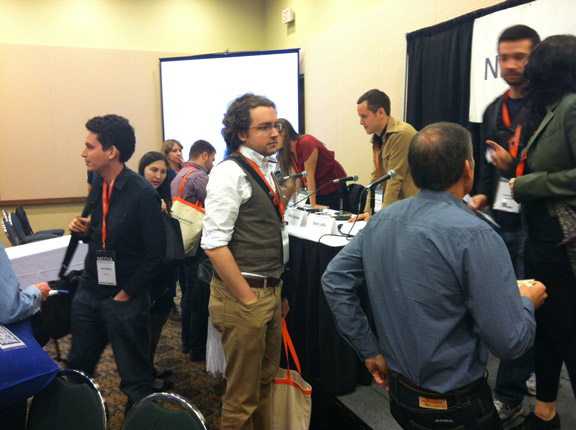
I hadn’t meant to attend this discussion, but I’m glad I did. Occupy Goes Home: The Occupy Movement and the Foreclosure Crisis was hands down the best thing I attended on Thursday, and blew the rest out of the water. Moderated by Sarah Jaffe (Labor Editor at AlterNet), it featured Matt Browner-Hamlin (from Occupy Our Homes), Nick Espinosa (of Occupy Homes Minnesota and the activist who famously glitter-bombed Newt Gingrich), and Rachel Falcone (of Housing is a Human Right and Organizing for Occupation).
This was perhaps the best argument for what Occupy needs to be, and the panel was really tight in relaying a strong message about the nature of the financial system effecting regular people and the seriousness and impact of debt. They pointed out that nearly the entire room was carrying some level of debt (myself included), whether it was on student loans or on mortgages. They pointed out that nearly all foreclosures during the crisis have been fraudulent or used fraudulent documents (a Nevada law that forbade robo-signing and punished people for filing foreclosures with fraudulent documents dropped foreclosures by 93% according to the panel, just to give you an idea of the rampant fraud).
I was overjoyed to hear that Guilford County, North Carolina was leading the way against foreclosures under the leadership of its Register of Deeds, Jeff Thigpen (I graduated from Guilford College). I really heard echoes of that early democratic finance movement in American history after the Revolution, especially in the actual resistance to creditors by various means. The idea of debt being something we’re all very ashamed of, but also a very universal experience in America is a powerful concept. And to tie it into this fraud-based foreclosure, well, a panelist made the point that this undercut nearly 500 years of jurisprudence in the Anglo-American tradition.
Ultimately, in terms of electrifying discussions, this was it. There was a very real, personal edge to this: Mr. Espinosa’s mother is facing foreclosure herself. I think also, it was a glimmer of success and a very powerful issue that Occupy touched on during its long months away. The question moving forward is whether it can return itself to prominence on a whole host of new issues in America, or whether the 2012 elections and the looming debt ceiling showdown (part 2!) will prevent it from being much an issue.
This was also a panel that provided actual solutions. Perhaps because it wasn’t so high up in the clouds, it really provided a sense of what needs to be accomplished. There are laws that can be advocated for, or passed by those in government (one person was a member of a county government and asked whether there was legislation to help prevent abuse by banks). Yes, they had criticisms of the whole system (the failure of the federal government to hold the banks accountable loomed largest). But they never failed to have a response to a question; even one about media coverage. The solution? Create your own media. And they’re right, because a sort of counter-media (to coin a phrase) is developing around this country; one of live-streamers, bloggers, and social media.
The final proof for me? When the panel ended, a mass of people surged forward to shake the hands of the speakers.

